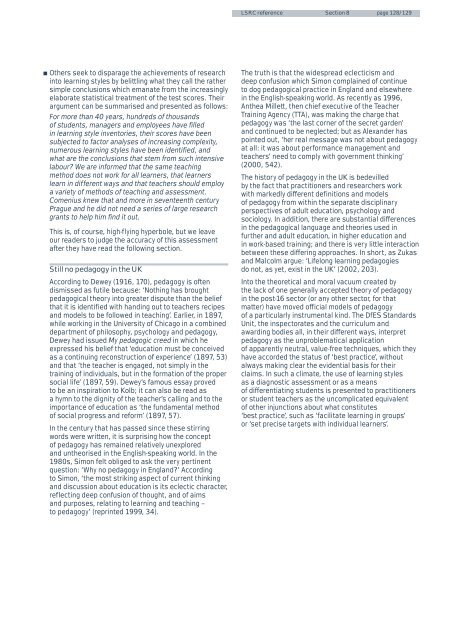learning-styles
learning-styles
learning-styles
You also want an ePaper? Increase the reach of your titles
YUMPU automatically turns print PDFs into web optimized ePapers that Google loves.
LSRC reference Section 8<br />
page 128/129<br />
Others seek to disparage the achievements of research<br />
into <strong>learning</strong> <strong>styles</strong> by belittling what they call the rather<br />
simple conclusions which emanate from the increasingly<br />
elaborate statistical treatment of the test scores. Their<br />
argument can be summarised and presented as follows:<br />
For more than 40 years, hundreds of thousands<br />
of students, managers and employees have filled<br />
in <strong>learning</strong> style inventories, their scores have been<br />
subjected to factor analyses of increasing complexity,<br />
numerous <strong>learning</strong> <strong>styles</strong> have been identified, and<br />
what are the conclusions that stem from such intensive<br />
labour? We are informed that the same teaching<br />
method does not work for all learners, that learners<br />
learn in different ways and that teachers should employ<br />
a variety of methods of teaching and assessment.<br />
Comenius knew that and more in seventeenth century<br />
Prague and he did not need a series of large research<br />
grants to help him find it out.<br />
This is, of course, high-flying hyperbole, but we leave<br />
our readers to judge the accuracy of this assessment<br />
after they have read the following section.<br />
Still no pedagogy in the UK<br />
According to Dewey (1916, 170), pedagogy is often<br />
dismissed as futile because: ‘Nothing has brought<br />
pedagogical theory into greater dispute than the belief<br />
that it is identified with handing out to teachers recipes<br />
and models to be followed in teaching’. Earlier, in 1897,<br />
while working in the University of Chicago in a combined<br />
department of philosophy, psychology and pedagogy,<br />
Dewey had issued My pedagogic creed in which he<br />
expressed his belief that ‘education must be conceived<br />
as a continuing reconstruction of experience’ (1897, 53)<br />
and that ‘the teacher is engaged, not simply in the<br />
training of individuals, but in the formation of the proper<br />
social life’ (1897, 59). Dewey’s famous essay proved<br />
to be an inspiration to Kolb; it can also be read as<br />
a hymn to the dignity of the teacher’s calling and to the<br />
importance of education as ‘the fundamental method<br />
of social progress and reform’ (1897, 57).<br />
In the century that has passed since these stirring<br />
words were written, it is surprising how the concept<br />
of pedagogy has remained relatively unexplored<br />
and untheorised in the English-speaking world. In the<br />
1980s, Simon felt obliged to ask the very pertinent<br />
question: ‘Why no pedagogy in England?’ According<br />
to Simon, ‘the most striking aspect of current thinking<br />
and discussion about education is its eclectic character,<br />
reflecting deep confusion of thought, and of aims<br />
and purposes, relating to <strong>learning</strong> and teaching –<br />
to pedagogy’ (reprinted 1999, 34).<br />
The truth is that the widespread eclecticism and<br />
deep confusion which Simon complained of continue<br />
to dog pedagogical practice in England and elsewhere<br />
in the English-speaking world. As recently as 1996,<br />
Anthea Millett, then chief executive of the Teacher<br />
Training Agency (TTA), was making the charge that<br />
pedagogy was ‘the last corner of the secret garden’<br />
and continued to be neglected; but as Alexander has<br />
pointed out, ‘her real message was not about pedagogy<br />
at all: it was about performance management and<br />
teachers’ need to comply with government thinking’<br />
(2000, 542).<br />
The history of pedagogy in the UK is bedevilled<br />
by the fact that practitioners and researchers work<br />
with markedly different definitions and models<br />
of pedagogy from within the separate disciplinary<br />
perspectives of adult education, psychology and<br />
sociology. In addition, there are substantial differences<br />
in the pedagogical language and theories used in<br />
further and adult education, in higher education and<br />
in work-based training; and there is very little interaction<br />
between these differing approaches. In short, as Zukas<br />
and Malcolm argue: ‘Lifelong <strong>learning</strong> pedagogies<br />
do not, as yet, exist in the UK’ (2002, 203).<br />
Into the theoretical and moral vacuum created by<br />
the lack of one generally accepted theory of pedagogy<br />
in the post-16 sector (or any other sector, for that<br />
matter) have moved official models of pedagogy<br />
of a particularly instrumental kind. The DfES Standards<br />
Unit, the inspectorates and the curriculum and<br />
awarding bodies all, in their different ways, interpret<br />
pedagogy as the unproblematical application<br />
of apparently neutral, value-free techniques, which they<br />
have accorded the status of ‘best practice’, without<br />
always making clear the evidential basis for their<br />
claims. In such a climate, the use of <strong>learning</strong> <strong>styles</strong><br />
as a diagnostic assessment or as a means<br />
of differentiating students is presented to practitioners<br />
or student teachers as the uncomplicated equivalent<br />
of other injunctions about what constitutes<br />
‘best practice’, such as ‘facilitate <strong>learning</strong> in groups’<br />
or ‘set precise targets with individual learners’.


